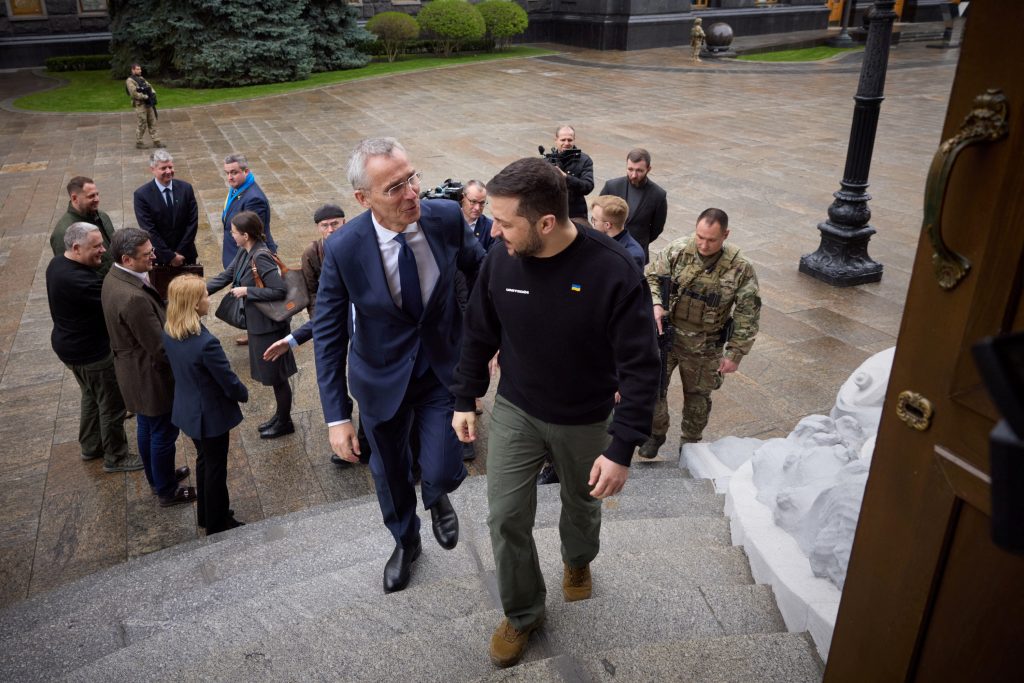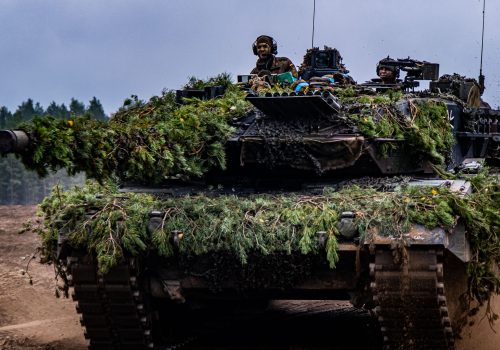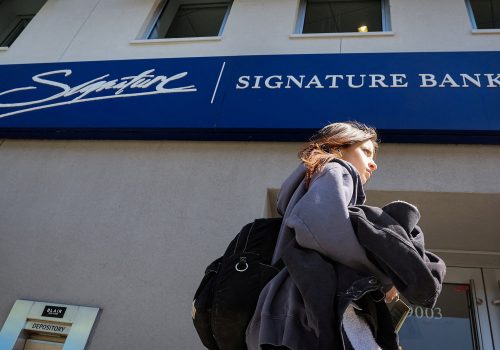The nature and scale of US support for Ukraine in the crucial months ahead boil down to one question: What sacrifices are the United States and its allies willing to make in the present to secure the future?
Fourteen months into Russia’s full-scale invasion, that’s a question that hovers not just over Ukraine but also over the emerging era of global competition.
As significant as political, military, and economic support has been for Ukraine thus far, it is insufficient to ensure the failure of Russian President Vladimir Putin’s war and land grab. If US President Joe Biden’s argument is right that the future of the global system is being tested in Ukraine—and I believe it is—then the response isn’t commensurate with those stakes.
Three logical flaws still prevent the West from rising to the historic challenge of Ukraine.
The first logical flaw is that the West must deter itself so as not to provoke a more escalatory response from Putin, including the use of tactical nuclear weapons. The truth, experience shows, is that only the clear demonstration of determination deters despots.
The second is that the United States needs to reduce its commitments in Europe to address the greater global challenge of China. The truth is that those contests are inseparable, as underscored by Putin’s recent meeting with Chinese leader Xi Jinping in Moscow.
The third is that it was the prospect of NATO enlargement that incited Putin to attack Ukraine. The truth is that it was the failure to extend that sort of security guarantee—a guarantee that has kept other former Soviet bloc states and most of Europe secure—that provoked Putin.
A year after Putin invaded and then annexed Ukraine’s Crimean peninsula, Henry Kissinger, the Atlantic Council’s longest-serving board member, spoke at the Council’s 2015 Global Citizen Awards about how the United States and its European partners had to change course to confront emerging global challenges.
“The Atlantic relationship that was initially developed primarily on military and strategic lines now really has to be extended into a conceptual question,” the former US secretary of state said. “What are we trying to achieve? What are we trying to prevent? And what sacrifices are we willing to make? Because great things cannot be achieved without some sacrifice of the present for the needs of the future.”
Ever since then, and particularly since Putin escalated his invasion of Ukraine in 2022, Kissinger’s challenge has haunted me: Is the West willing to make the necessary sacrifices in the present for the needs of the future? In my estimation, the answer to that question is “not yet,” despite remarkable support for Ukraine and a big burst of transatlantic unity, including Finland’s new NATO membership, with Sweden’s accession to the Alliance hopefully not far behind.
US President Joe Biden himself has said that with Putin’s invasion of Ukraine, “the principles that had been the cornerstone of peace, prosperity, and stability on this planet for more than seventy-five years were at risk of being shattered.” If those are the generational stakes, it follows that the sacrifices will be insufficient until Ukrainian security, sovereignty, freedom, and independence are assured.
Through his audacious trip to Kyiv on February 20, Biden has tied his presidential legacy as clearly to Ukraine’s future as US President Ronald Reagan bound his legacy to Berlin’s future with his “Tear Down This Wall” speech in 1987. Yet without delivering on Ukraine, that legacy will be lost.
The historic stakes grew all the more apparent during Xi’s March visit to Moscow, where he and Putin made clear their ambition to remake the liberal international order that has prevailed since the end of World War II. As Xi told Putin before departing, “together, we should push forward these changes that have not happened for one hundred years.”
Muddled thinking and an insufficient sense of urgency could provide Xi and Putin with the outcome they desire, in Ukraine first and then beyond.
What both of them know is that their prospects improve with every additional month of war in Ukraine, which will only wear down and fatigue Ukraine and its supporters—and serve Russian and Chinese interests.
“One of the reasons this war is still ongoing,” writes Andrew A. Michta for the Atlantic Council, “is the West’s extreme caution… The West has given Ukraine enough to survive, but not enough to win. This strategy, though it seems reasonable today, will likely require the world to pay a much higher price in blood and treasure in the coming years.”
Michta argues, for example, that if Ukraine’s partners had provided the country more wherewithal during Kyiv’s military offensive last summer—in the form of the precision long-range fires, main battle tanks, and aircraft it sought—“its forces would have stood a good chance of achieving a strategic decision on the battlefield and perhaps ultimately winning the peace.”
Then there’s the misguided notion that the United States should pivot away from Europe and toward China.
If the United States hopes to deter China from attacking Taiwan, the place to start is in Ukraine by visibly ramping up defense production and increasing military support to Kyiv as well as expanding sanctions against Russia and tightening their enforcement. If the United States and its allies help Ukraine turn back Putin, it could give Xi second thoughts regarding Taiwan.
Then there’s the muddled thinking that concerns NATO’s role in securing Europe. Those former Soviet bloc countries that became NATO members remain secure and at peace, while it has been the gray areas like Ukraine, Georgia, and Moldova that have invited Russian aggression.
Even Kissinger, who was long against any enlargement of NATO, has come to accept that such a course will be necessary to ensure European stability. As he said in Davos this year at the World Economic Forum, “the idea of a neutral Ukraine under these conditions is no longer meaningful. I believe Ukrainian membership in NATO would be a[n] appropriate outcome.”
NATO’s summit in Vilnius, Lithuania, in July would be a good time for Western leaders to take the first concrete steps in that direction.
In a recent memo to NATO leaders, the Atlantic Council’s Ian Brzezinski and Alexander Vershbow—a former Pentagon official and former US ambassador to NATO, respectively—lay out an approach that’s both urgent and achievable.
They propose a “new NATO-Ukraine Deterrence and Defense Partnership… aimed at building up Ukraine’s long-term capacity to defend itself.” They also recommend Ukraine should be invited now to attend meetings of the North Atlantic Council, NATO’s governing body.
Both proposals would open a path, after the war, for Ukraine’s accession to NATO, following Finland and Sweden. Bolder measures must follow at NATO’s seventy-fifth-anniversary summit in Washington, DC, in 2024.
That is the right path to secure the global future, but for NATO leaders, it will require sacrifice in the present.
That would be a good habit to establish for the challenging years ahead.
Frederick Kempe is president and chief executive officer of the Atlantic Council. You can follow him on Twitter @FredKempe.
THE WEEK’S TOP READS
#1 Evan Gershkovich: The Latest Updates on the WSJ Reporter Detained in Russia
WALL STREET JOURNAL
Among Putin’s brutal oppressive tactics has been his “hostage diplomacy.” For me—a former journalist who spent twenty-five years at the Wall Street Journal—Putin’s arbitrary detention of WSJ reporter Evan Gershkovich strikes particularly close to home. I urge my readers to familiarize themselves with these horrible events and follow the WSJ‘s guide on how to help. Also, read about his letter to his parents demonstrating his humor (he writes that his mother’s cooking prepared him for prison meals!) and resilience. Read more →
#2 Why America Still Needs Europe
Michael J. Mazarr / FOREIGN AFFAIRS
Michael Mazarr highlights the flaws present in trying to focus on China while ignoring Russia in US defense strategy.
“On a conceptual level,” Mazarr writes, “this idea is bold and thought-provoking. In theory, by empowering allies to take the lead in Europe and liberating US resources for use in Asia, Washington can significantly bolster its Indo-Pacific posture. But a closer look at the dynamics in play shows how self-defeating such a shift would be in practice. Instead of strengthening Washington’s hand in Asia, the result could be to badly weaken the United States in its growing competition with China.”
Continues Mazaar, “the growing partnership between Russia and China means that Europe and the Indo-Pacific are now inextricably linked. However much the United States may wish to prioritize one region over the other, backing off from Europe will empower Russia, China’s primary partner and ally, even as it feeds Beijing’s narratives about US decline and the triumph of autocracy.” Read more →
#3 The Pentagon documents leak will embolden Putin as he tries to outlast Ukraine
Trudy Rubin | THE PHILADELPHIA INQUIRER
In the aftermath of the disastrous classified-document leaks, Trudy Rubin argues how US pessimism about Ukraine’s chances endangers Ukraine.
“Moscow may or may not have been aware of Ukraine’s weakened air defenses,” Rubin notes, “But the release of this downbeat Pentagon analysis hurts Ukrainian morale at a critical moment. It will surely encourage Vladimir Putin in his belief that he can outlast the Ukrainian military. And it fuels critics who insist—with stunning ignorance of Putin’s behavior—that now is the time for negotiations. Worst of all, these documents tell Putin that the Pentagon is dubious about prospects for Ukrainian success—for totally wrongheaded reasons—and is still unready to make that success possible. They reveal more about the weakness of the Pentagon’s strategic thinking than Ukraine’s.” Read more →
#4 Why Chatbot AI Is a Problem for China
Michael Schuman / THE ATLANTIC
The Atlantic Council’s Michael Schuman, one of the most insightful China watchers writing today, exposes how China’s vast censorship machine may well hobble its efforts to create viable artificial intelligence (AI) chatbots, setting it back in technological competition.
“The Chinese Communist Party,” Schuman explains, “keeps itself in power through censorship, and under its domineering leader, Xi Jinping, that effort has intensified in a quest for greater ideological conformity. Chatbots are especially tricky to censor. What they blurt out can be unpredictable, and when it comes to micromanaging what the Chinese public knows, reads, and shares, the authorities don’t like surprises.”
“Yet,” he adds, “this political imperative collides with the country’s urgent and essential need for innovation, especially in areas such as AI and chatbots. Without continuing technological advances, China’s economic miracle could stall and undercut Xi’s aim of overtaking the United States as the world’s premier superpower. Xi is as intent on his campaign for technological progress as he is on his drive for stricter social control. The development of AI is a crucial pillar of that program, and ChatGPT has exposed how China’s tech sector still lags behind that of its chief geopolitical rival, the US.” Read more →
#5 Crooks’ Mistaken Bet on Encrypted Phones
Ed Caesar / THE NEW YORKER
This week’s must-read is Ed Caesar’s astonishing look at how cracking encrypted phone networks exposed the colossal international scale and nature of organized crime. From yachts in the South Pacific to weddings in Dubai to the backroom of a Montenegrin auto shop, Caesar tells the story of how phone communications revealed the truly transnational nature of organized crime.
“In October,” writes Caesar, “the two most senior Europol officers working on serious and organized crime met with me at the agency’s headquarters, a forbidding office building in a quiet neighborhood of The Hague. Jean-Philippe Lecouffe, a Frenchman, and Jari Liukku, a Finn, have more than seventy years’ worth of policing experience between them. Neither could remember another breakthrough in which they had learned so much so quickly. For one thing, Liukku said, the phone busts had apprised them of important figures in organized crime who had been ‘completely unknown’ to them and who must have felt ‘untouchable.’ Now these men—it was almost always men—were active targets.”
Continues Caesar, “Lecouffe told me that, before the encrypted-phone stings, police forces were ‘a bit in the dark’ about how organized crime functioned from day to day, even if the occasional successful investigation provided faint illumination on a group or an activity. Suddenly, it was if somebody had switched on thousands of klieg lights, and ‘we could not only take a picture but a movie.’” Read more →
Atlantic Council top reads
Image: Ukraine's President Volodymyr Zelenskiy and NATO Secretary-General Jens Stoltenberg meet, amid Russia's attack on Ukraine, in Kyiv, Ukraine on April 20, 2023. Ukrainian Presidential Press Service/Handout.



